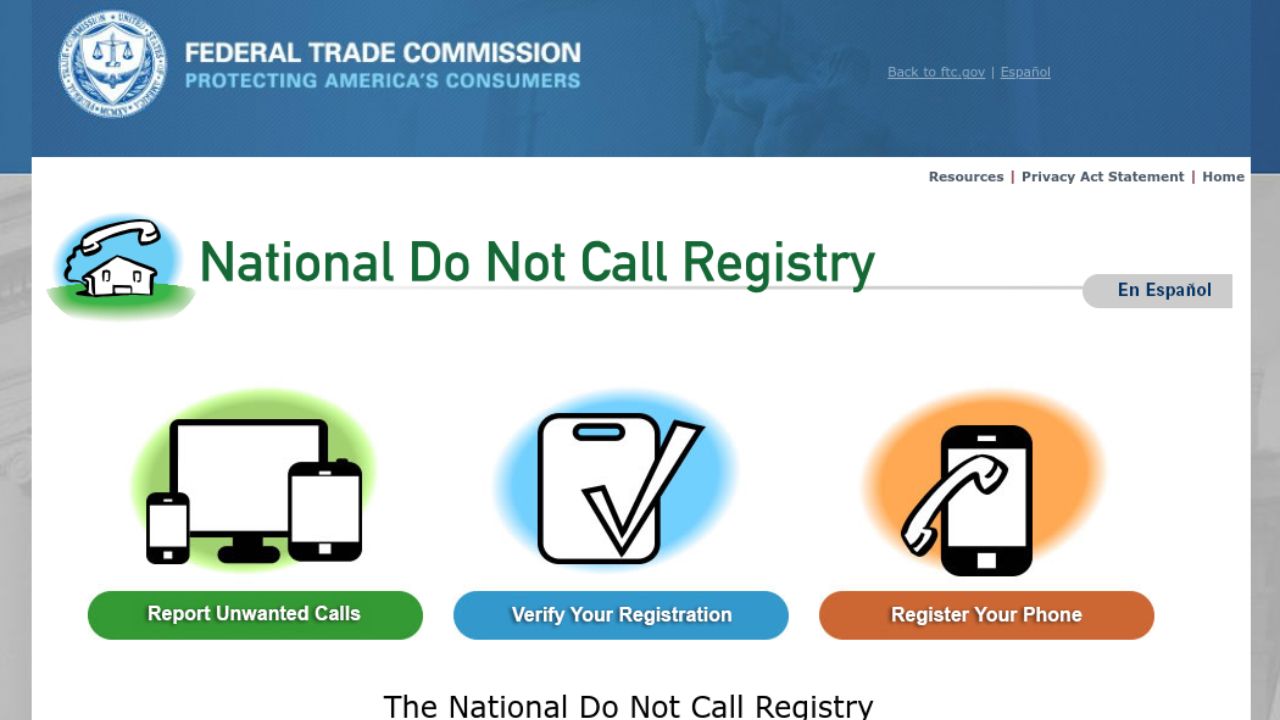If you’ve taken the time to read our tips here at Cyberguy to keep phone scammers at bay, good for you. One of these tips is to put your phone number on the national and state “Do Not Call” list. However, you might find that you’re still getting calls from scammers. This is because the Do Not Call list primarily targets legitimate telemarketers and has limited effectiveness against scammers and illegal robocallers who often ignore the list.
This is what happened to one of our newsletter subscribers, who told us that even though she took the time to put her number on that list, she still receives many annoying calls. “I repeatedly tell them to remove my number and stop calling, but they continue to call.” She noted that the caller ID indicates that these phone calls are coming from spoofed phone numbers. Even though she blocked these numbers, too (another tip to ward off scammers), they’d call back from another number. So, why is this permitted? And, how come being on the “Do Not Call” list is not enough? Let’s thoroughly answer this once and for all.
GET SECURITY ALERTS, EXPERT TIPS – SIGN UP FOR KURT’S NEWSLETTER – THE CYBERGUY REPORT HERE

Credit: FTC
How scam calls get through the “Do Not Call” list
Receiving calls from scammers when you’ve gone out of your way to prevent them from calling you can be rather frustrating.
Unfortunately, despite being on the Do Not Call list, you may still receive unwanted calls due to a few reasons:
Some types of calls are exempt from the “Do Not Call” regulations. These include calls from political organizations, charities, and companies with whom you have an existing business relationship. Of course, if the scammer spoofs a government phone number, they may appear to be exempt from the “Do Not Call” list, even though they are not actually a legitimate government entity.
Scammers often disregard the “Do Not Call list” and continue to make unsolicited calls. These individuals and organizations engage in illegal activities and are not bound by the regulations set forth by the FTC. After all, these scammers are not really one to follow the rules.
Sometimes, telemarketing companies or organizations may inadvertently call numbers on the “Do Not Call” list due to data errors or technical issues. Though, this is less likely.
Additionally, scammers can purchase phone numbers on the dark web, allowing them to target a wide range of individuals regardless of their registration on the “Do Not Call” list.
Again, because scammers can spoof phone numbers to make any number appear on the caller ID (even if it belongs to someone else), it’s much easier for them to bypass the “Do Not Call” list loophole.

HOW TO TRACE AND BLOCK ANONYMOUS CALLS
How to keep scammers from calling you at all costs
While we’d like to think it’s enough to put your number on the national and state “Do Not Call” list, as we learned from this subscriber, it’s not a foolproof method. They can still find ways to get to you. That being said, don’t neglect putting your number on this list. Keeping scammers from calling you requires a combination of different strategies, and each one helps reduce the number of scam calls you’ll get over time.
1) Invest in personal data removal services: While no service promises to remove all your data from the internet, having a removal service is great if you want to constantly monitor and automate the process of removing your information from hundreds of sites continuously over a longer period of time.
A service like Incogni can help you remove all this personal information from the internet. It has a very clean interface and will scan 195 websites for your information and remove it and keep it removed.
Special for CyberGuy Readers (60% off): Incogni offers A 30-day money-back guarantee and then charges a special CyberGuy discount only through the links in this article of $5.99/month for one person (billed annually) or $13.19/month for your family (up to 4 people) on their annual plan and get a fully automated data removal service, including recurring removal from 200+ data brokers. You can add up to 3 emails, 3 home addresses and 3 phone numbers (U.S. citizens only) and have them removed from data-broker databases. I recommend the family plan because it works out to only $4.12 per person per month for year-round coverage. It’s an excellent service, and I highly recommend at least trying it out to see what it’s all about.
Get Incogni for your family (up to 4 people) here
2) Check to see if any websites you have an account with may have had a data breach recently. Changing your passwords frequently can help prevent more damage from being done. Also, consider using a password manager to generate and store complex passwords.
3) Don’t answer calls from unknown numbers. Let them go to voicemail.
4) Use your phone’s spam blocker features.
5) Notify your mobile service provider about the calls and see what they can help you do.
6) Never reply or call back a number you don’t recognize. If the area code is familiar to you but not the rest of the phone number, it could very well be a scammer who is intentionally phone spoofing someone’s number within the same area code, for the sole purpose that you’ll recognize it and feel more inclined to answer it.
7) Block robocalls and unknown numbers.
8) Report the unwanted calls to the FTC and your state attorney general’s office, especially if it’s a repeated number or person claiming to be from the same organization.
9) If the calls are still coming, consider changing your phone number.
10) Consult a Consumer Protection Attorney if the calls really don’t stop.
11) Remember never to provide your personal information over the phone. If anyone calls you to ask for your sensitive data, do not give it over, even as trusting the person might sound or as legitimate as the reason may seem. These days, because scams are so prevalent, there shouldn’t be any company calling you and asking you for this information over the phone. Always do your due diligence.

HOW TO BLOCK THOSE UNWANTED AND ANNOYING SPAM EMAILS
Kurt’s key takeaways
Putting your phone number on the “Do Not Call” list is a great step in keeping scammers away. But, it’s not the only way. It takes utilizing different strategies — and, keeping up with those strategies — to send the scammers elsewhere.
If you could design a new feature for smartphones to prevent scam calls, what would it be? Let us know in the comments below.
FOR MORE OF MY SECURITY ALERTS, SUBSCRIBE TO MY FREE CYBERGUY REPORT NEWSLETTER HERE
Copyright 2025 CyberGuy.com. All rights reserved. CyberGuy.com articles and content may contain affiliate links that earn a commission when purchases are made.



10 comments
Robo calls have turned into robo texts. Why can’t the merchant codes used by credit card companies to block different types of merchants be used by cell phone company’s or security apps for things like unwanted political texts etc.?
I believe the phone companies such as Verizon, AT&T and others could be more involved. They certainly can see the amount of calls these people are making and investigate. They don’t because the make money on the service they provide them.
I believe if the phone companies who “own” the phone number should be held accountable for the runaway train of spammers, and ghost callers. They need to step up to the plate and validate the authenticity of the person offering to pay to rent or lease a number. Why won’t they do this? People can DIE from trying to answer a phone call while they’re driving a car – this very well could have already killed how many people??? I hope you can address this with the appropriate entities. What purpose does renting / leasing numbers serve other than to collect personal information on their client’s who pay good money for a phone number and keep it for many years? The phone companies need to STOP playing dumb, STOP leasing out the extra numbers they have. This is stabbing real customer’s in the back in trade for the money they receive from these illegitimate individuals. They let the gate wide open!!! STOP THE MADNESS!!!
Not only are the phone companies collectively getting paid from the domestic and international scammers, they’re getting paid by their legitimate customer’s for their phone provider to block the very numbers they receive rental monies from. When does it stop?
With all the technology avaliable to the FTC it’s only laziness on their part that they do not stop this calls.
I’m in total agreement with Toni F. Us paying customers need to start…PUTTING PRESSURE ON THESE PHONE COMPANIES WHO ARE LETTING THIS HAPPEN!! There was a law, if you tell them to stop and they continue to call you, you were able to sue them for $1000.
How can we block political calls and text? I donated money 8 years ago and I’ve gotten non stop calls and text since then.
Hi Dave, please see our tips on how to help tame political text messages here. You can see our tips on dealing with their annoying robocalls here.
How about an algorithm that compares the outgoing number to the actual number where the call originates. If they don’t match the call does not go thru. The phone companies should be required to develop and implement this. You can exclude data in a spreadsheet that doesn’t meet a certain criteria so why not spam calls?
There is a survey company named Dynata that some of these scammers work for. They use the Company’s telephone spoofing devices to scam people.